The Role of Stakeholder Theory in Non-profit Leadership and Management
VerifiedAdded on 2021/02/20
|7
|1958
|36
Report
AI Summary
This report delves into the application of stakeholder theory within non-profit organizations, examining its significance in effective leadership and management. The report analyzes how NGOs can leverage stakeholder engagement to improve their performance and achieve long-term development. It explores various aspects of stakeholder theory, including corporate social responsibility (CSR) implementation, the impact of stakeholder pressure, and the role of volunteers and donors. The report further investigates mechanisms of change, cooperative initiatives, and the integration of environmental, social, and governance (ESG) factors for sustainable development. Additionally, it examines the evolution of CSR from a stakeholder perspective, the relationship between NGOs and their geographical areas, and the design of environmental strategies. The analysis highlights the importance of stakeholder dialogue and the diverse roles of different stakeholder groups, such as contractual and constitutional stakeholders, in driving organizational success. The conclusion emphasizes the value of stakeholder theory in guiding non-profit organizations towards strategic actions, sustainable development, and effective leadership, fostering strong interrelationships and long-term growth.
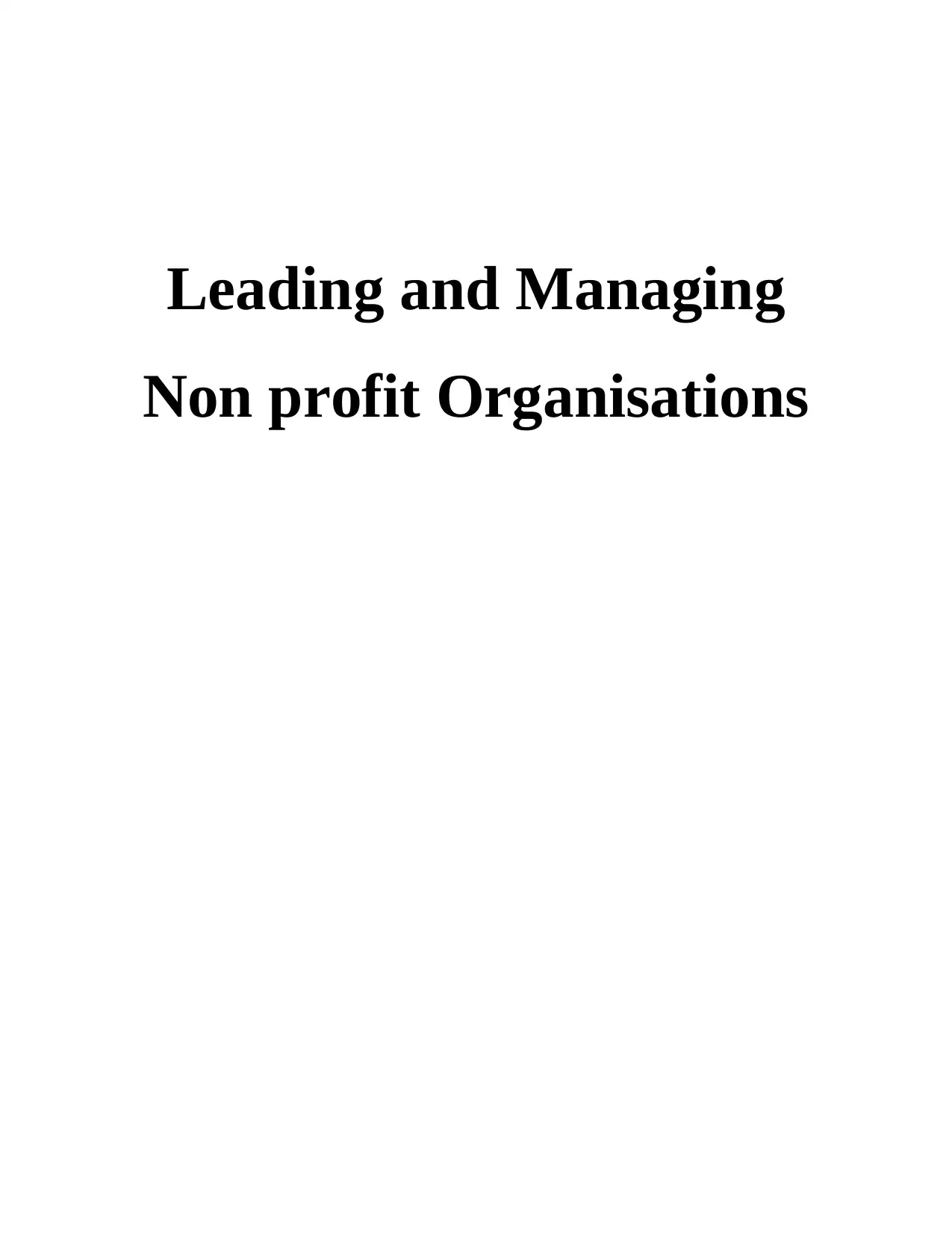
Leading and Managing
Non profit Organisations
Non profit Organisations
Paraphrase This Document
Need a fresh take? Get an instant paraphrase of this document with our AI Paraphraser

Table of Contents
INTRODUCTION...........................................................................................................................3
MAIN BODY...................................................................................................................................3
CONCLUSION................................................................................................................................7
INTRODUCTION...........................................................................................................................3
MAIN BODY...................................................................................................................................3
CONCLUSION................................................................................................................................7
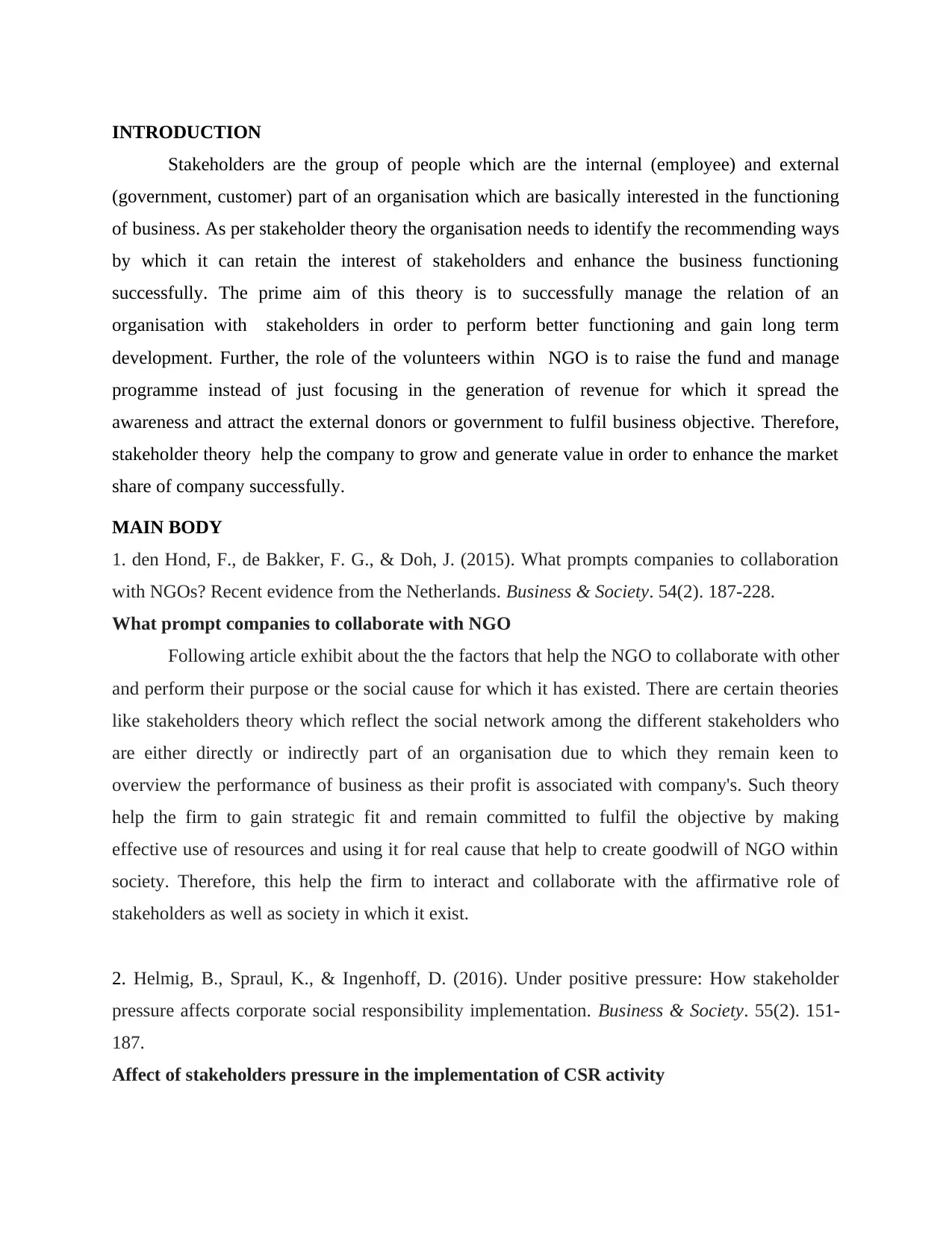
INTRODUCTION
Stakeholders are the group of people which are the internal (employee) and external
(government, customer) part of an organisation which are basically interested in the functioning
of business. As per stakeholder theory the organisation needs to identify the recommending ways
by which it can retain the interest of stakeholders and enhance the business functioning
successfully. The prime aim of this theory is to successfully manage the relation of an
organisation with stakeholders in order to perform better functioning and gain long term
development. Further, the role of the volunteers within NGO is to raise the fund and manage
programme instead of just focusing in the generation of revenue for which it spread the
awareness and attract the external donors or government to fulfil business objective. Therefore,
stakeholder theory help the company to grow and generate value in order to enhance the market
share of company successfully.
MAIN BODY
1. den Hond, F., de Bakker, F. G., & Doh, J. (2015). What prompts companies to collaboration
with NGOs? Recent evidence from the Netherlands. Business & Society. 54(2). 187-228.
What prompt companies to collaborate with NGO
Following article exhibit about the the factors that help the NGO to collaborate with other
and perform their purpose or the social cause for which it has existed. There are certain theories
like stakeholders theory which reflect the social network among the different stakeholders who
are either directly or indirectly part of an organisation due to which they remain keen to
overview the performance of business as their profit is associated with company's. Such theory
help the firm to gain strategic fit and remain committed to fulfil the objective by making
effective use of resources and using it for real cause that help to create goodwill of NGO within
society. Therefore, this help the firm to interact and collaborate with the affirmative role of
stakeholders as well as society in which it exist.
2. Helmig, B., Spraul, K., & Ingenhoff, D. (2016). Under positive pressure: How stakeholder
pressure affects corporate social responsibility implementation. Business & Society. 55(2). 151-
187.
Affect of stakeholders pressure in the implementation of CSR activity
Stakeholders are the group of people which are the internal (employee) and external
(government, customer) part of an organisation which are basically interested in the functioning
of business. As per stakeholder theory the organisation needs to identify the recommending ways
by which it can retain the interest of stakeholders and enhance the business functioning
successfully. The prime aim of this theory is to successfully manage the relation of an
organisation with stakeholders in order to perform better functioning and gain long term
development. Further, the role of the volunteers within NGO is to raise the fund and manage
programme instead of just focusing in the generation of revenue for which it spread the
awareness and attract the external donors or government to fulfil business objective. Therefore,
stakeholder theory help the company to grow and generate value in order to enhance the market
share of company successfully.
MAIN BODY
1. den Hond, F., de Bakker, F. G., & Doh, J. (2015). What prompts companies to collaboration
with NGOs? Recent evidence from the Netherlands. Business & Society. 54(2). 187-228.
What prompt companies to collaborate with NGO
Following article exhibit about the the factors that help the NGO to collaborate with other
and perform their purpose or the social cause for which it has existed. There are certain theories
like stakeholders theory which reflect the social network among the different stakeholders who
are either directly or indirectly part of an organisation due to which they remain keen to
overview the performance of business as their profit is associated with company's. Such theory
help the firm to gain strategic fit and remain committed to fulfil the objective by making
effective use of resources and using it for real cause that help to create goodwill of NGO within
society. Therefore, this help the firm to interact and collaborate with the affirmative role of
stakeholders as well as society in which it exist.
2. Helmig, B., Spraul, K., & Ingenhoff, D. (2016). Under positive pressure: How stakeholder
pressure affects corporate social responsibility implementation. Business & Society. 55(2). 151-
187.
Affect of stakeholders pressure in the implementation of CSR activity
⊘ This is a preview!⊘
Do you want full access?
Subscribe today to unlock all pages.

Trusted by 1+ million students worldwide
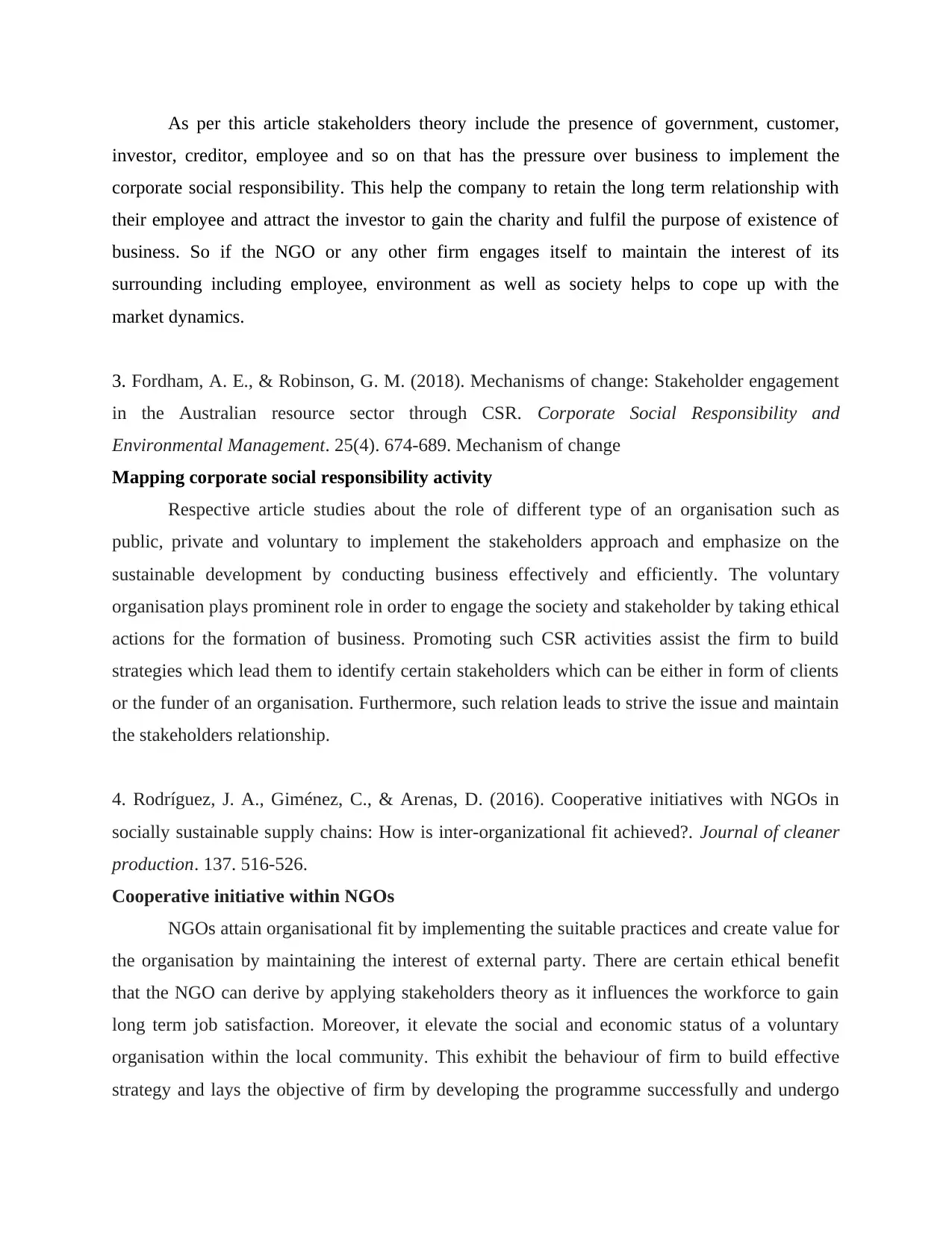
As per this article stakeholders theory include the presence of government, customer,
investor, creditor, employee and so on that has the pressure over business to implement the
corporate social responsibility. This help the company to retain the long term relationship with
their employee and attract the investor to gain the charity and fulfil the purpose of existence of
business. So if the NGO or any other firm engages itself to maintain the interest of its
surrounding including employee, environment as well as society helps to cope up with the
market dynamics.
3. Fordham, A. E., & Robinson, G. M. (2018). Mechanisms of change: Stakeholder engagement
in the Australian resource sector through CSR. Corporate Social Responsibility and
Environmental Management. 25(4). 674-689. Mechanism of change
Mapping corporate social responsibility activity
Respective article studies about the role of different type of an organisation such as
public, private and voluntary to implement the stakeholders approach and emphasize on the
sustainable development by conducting business effectively and efficiently. The voluntary
organisation plays prominent role in order to engage the society and stakeholder by taking ethical
actions for the formation of business. Promoting such CSR activities assist the firm to build
strategies which lead them to identify certain stakeholders which can be either in form of clients
or the funder of an organisation. Furthermore, such relation leads to strive the issue and maintain
the stakeholders relationship.
4. Rodríguez, J. A., Giménez, C., & Arenas, D. (2016). Cooperative initiatives with NGOs in
socially sustainable supply chains: How is inter-organizational fit achieved?. Journal of cleaner
production. 137. 516-526.
Cooperative initiative within NGOs
NGOs attain organisational fit by implementing the suitable practices and create value for
the organisation by maintaining the interest of external party. There are certain ethical benefit
that the NGO can derive by applying stakeholders theory as it influences the workforce to gain
long term job satisfaction. Moreover, it elevate the social and economic status of a voluntary
organisation within the local community. This exhibit the behaviour of firm to build effective
strategy and lays the objective of firm by developing the programme successfully and undergo
investor, creditor, employee and so on that has the pressure over business to implement the
corporate social responsibility. This help the company to retain the long term relationship with
their employee and attract the investor to gain the charity and fulfil the purpose of existence of
business. So if the NGO or any other firm engages itself to maintain the interest of its
surrounding including employee, environment as well as society helps to cope up with the
market dynamics.
3. Fordham, A. E., & Robinson, G. M. (2018). Mechanisms of change: Stakeholder engagement
in the Australian resource sector through CSR. Corporate Social Responsibility and
Environmental Management. 25(4). 674-689. Mechanism of change
Mapping corporate social responsibility activity
Respective article studies about the role of different type of an organisation such as
public, private and voluntary to implement the stakeholders approach and emphasize on the
sustainable development by conducting business effectively and efficiently. The voluntary
organisation plays prominent role in order to engage the society and stakeholder by taking ethical
actions for the formation of business. Promoting such CSR activities assist the firm to build
strategies which lead them to identify certain stakeholders which can be either in form of clients
or the funder of an organisation. Furthermore, such relation leads to strive the issue and maintain
the stakeholders relationship.
4. Rodríguez, J. A., Giménez, C., & Arenas, D. (2016). Cooperative initiatives with NGOs in
socially sustainable supply chains: How is inter-organizational fit achieved?. Journal of cleaner
production. 137. 516-526.
Cooperative initiative within NGOs
NGOs attain organisational fit by implementing the suitable practices and create value for
the organisation by maintaining the interest of external party. There are certain ethical benefit
that the NGO can derive by applying stakeholders theory as it influences the workforce to gain
long term job satisfaction. Moreover, it elevate the social and economic status of a voluntary
organisation within the local community. This exhibit the behaviour of firm to build effective
strategy and lays the objective of firm by developing the programme successfully and undergo
Paraphrase This Document
Need a fresh take? Get an instant paraphrase of this document with our AI Paraphraser
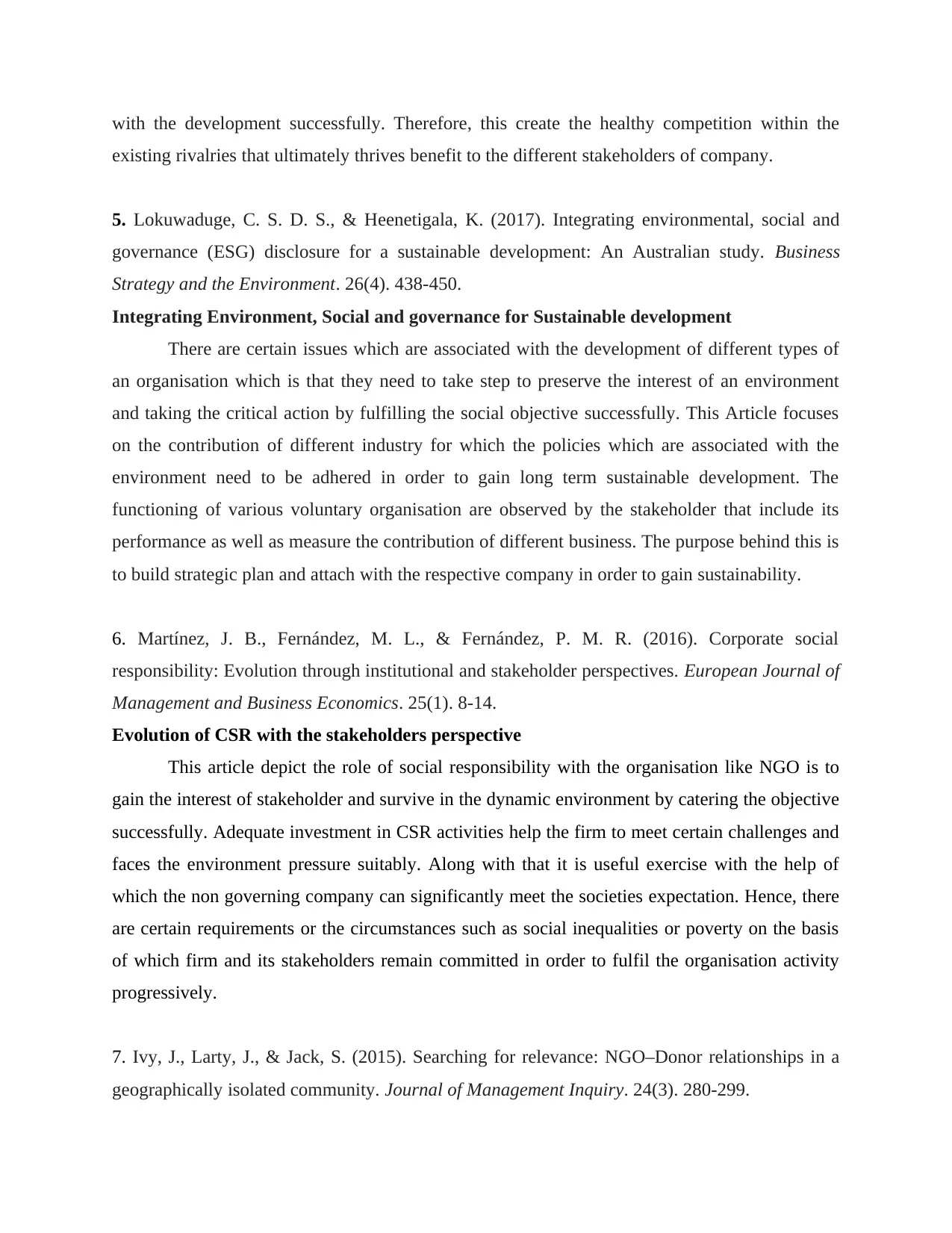
with the development successfully. Therefore, this create the healthy competition within the
existing rivalries that ultimately thrives benefit to the different stakeholders of company.
5. Lokuwaduge, C. S. D. S., & Heenetigala, K. (2017). Integrating environmental, social and
governance (ESG) disclosure for a sustainable development: An Australian study. Business
Strategy and the Environment. 26(4). 438-450.
Integrating Environment, Social and governance for Sustainable development
There are certain issues which are associated with the development of different types of
an organisation which is that they need to take step to preserve the interest of an environment
and taking the critical action by fulfilling the social objective successfully. This Article focuses
on the contribution of different industry for which the policies which are associated with the
environment need to be adhered in order to gain long term sustainable development. The
functioning of various voluntary organisation are observed by the stakeholder that include its
performance as well as measure the contribution of different business. The purpose behind this is
to build strategic plan and attach with the respective company in order to gain sustainability.
6. Martínez, J. B., Fernández, M. L., & Fernández, P. M. R. (2016). Corporate social
responsibility: Evolution through institutional and stakeholder perspectives. European Journal of
Management and Business Economics. 25(1). 8-14.
Evolution of CSR with the stakeholders perspective
This article depict the role of social responsibility with the organisation like NGO is to
gain the interest of stakeholder and survive in the dynamic environment by catering the objective
successfully. Adequate investment in CSR activities help the firm to meet certain challenges and
faces the environment pressure suitably. Along with that it is useful exercise with the help of
which the non governing company can significantly meet the societies expectation. Hence, there
are certain requirements or the circumstances such as social inequalities or poverty on the basis
of which firm and its stakeholders remain committed in order to fulfil the organisation activity
progressively.
7. Ivy, J., Larty, J., & Jack, S. (2015). Searching for relevance: NGO–Donor relationships in a
geographically isolated community. Journal of Management Inquiry. 24(3). 280-299.
existing rivalries that ultimately thrives benefit to the different stakeholders of company.
5. Lokuwaduge, C. S. D. S., & Heenetigala, K. (2017). Integrating environmental, social and
governance (ESG) disclosure for a sustainable development: An Australian study. Business
Strategy and the Environment. 26(4). 438-450.
Integrating Environment, Social and governance for Sustainable development
There are certain issues which are associated with the development of different types of
an organisation which is that they need to take step to preserve the interest of an environment
and taking the critical action by fulfilling the social objective successfully. This Article focuses
on the contribution of different industry for which the policies which are associated with the
environment need to be adhered in order to gain long term sustainable development. The
functioning of various voluntary organisation are observed by the stakeholder that include its
performance as well as measure the contribution of different business. The purpose behind this is
to build strategic plan and attach with the respective company in order to gain sustainability.
6. Martínez, J. B., Fernández, M. L., & Fernández, P. M. R. (2016). Corporate social
responsibility: Evolution through institutional and stakeholder perspectives. European Journal of
Management and Business Economics. 25(1). 8-14.
Evolution of CSR with the stakeholders perspective
This article depict the role of social responsibility with the organisation like NGO is to
gain the interest of stakeholder and survive in the dynamic environment by catering the objective
successfully. Adequate investment in CSR activities help the firm to meet certain challenges and
faces the environment pressure suitably. Along with that it is useful exercise with the help of
which the non governing company can significantly meet the societies expectation. Hence, there
are certain requirements or the circumstances such as social inequalities or poverty on the basis
of which firm and its stakeholders remain committed in order to fulfil the organisation activity
progressively.
7. Ivy, J., Larty, J., & Jack, S. (2015). Searching for relevance: NGO–Donor relationships in a
geographically isolated community. Journal of Management Inquiry. 24(3). 280-299.
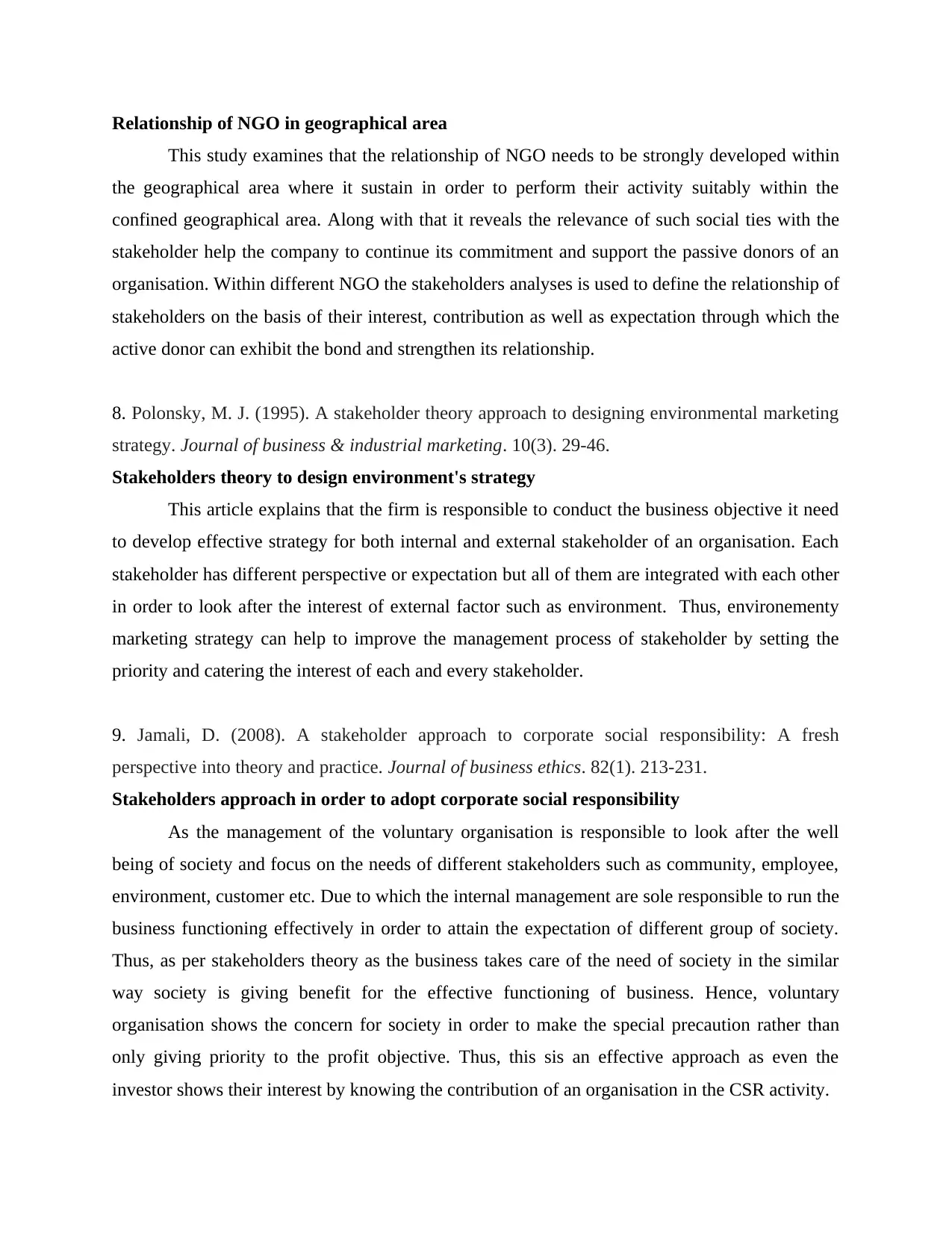
Relationship of NGO in geographical area
This study examines that the relationship of NGO needs to be strongly developed within
the geographical area where it sustain in order to perform their activity suitably within the
confined geographical area. Along with that it reveals the relevance of such social ties with the
stakeholder help the company to continue its commitment and support the passive donors of an
organisation. Within different NGO the stakeholders analyses is used to define the relationship of
stakeholders on the basis of their interest, contribution as well as expectation through which the
active donor can exhibit the bond and strengthen its relationship.
8. Polonsky, M. J. (1995). A stakeholder theory approach to designing environmental marketing
strategy. Journal of business & industrial marketing. 10(3). 29-46.
Stakeholders theory to design environment's strategy
This article explains that the firm is responsible to conduct the business objective it need
to develop effective strategy for both internal and external stakeholder of an organisation. Each
stakeholder has different perspective or expectation but all of them are integrated with each other
in order to look after the interest of external factor such as environment. Thus, environementy
marketing strategy can help to improve the management process of stakeholder by setting the
priority and catering the interest of each and every stakeholder.
9. Jamali, D. (2008). A stakeholder approach to corporate social responsibility: A fresh
perspective into theory and practice. Journal of business ethics. 82(1). 213-231.
Stakeholders approach in order to adopt corporate social responsibility
As the management of the voluntary organisation is responsible to look after the well
being of society and focus on the needs of different stakeholders such as community, employee,
environment, customer etc. Due to which the internal management are sole responsible to run the
business functioning effectively in order to attain the expectation of different group of society.
Thus, as per stakeholders theory as the business takes care of the need of society in the similar
way society is giving benefit for the effective functioning of business. Hence, voluntary
organisation shows the concern for society in order to make the special precaution rather than
only giving priority to the profit objective. Thus, this sis an effective approach as even the
investor shows their interest by knowing the contribution of an organisation in the CSR activity.
This study examines that the relationship of NGO needs to be strongly developed within
the geographical area where it sustain in order to perform their activity suitably within the
confined geographical area. Along with that it reveals the relevance of such social ties with the
stakeholder help the company to continue its commitment and support the passive donors of an
organisation. Within different NGO the stakeholders analyses is used to define the relationship of
stakeholders on the basis of their interest, contribution as well as expectation through which the
active donor can exhibit the bond and strengthen its relationship.
8. Polonsky, M. J. (1995). A stakeholder theory approach to designing environmental marketing
strategy. Journal of business & industrial marketing. 10(3). 29-46.
Stakeholders theory to design environment's strategy
This article explains that the firm is responsible to conduct the business objective it need
to develop effective strategy for both internal and external stakeholder of an organisation. Each
stakeholder has different perspective or expectation but all of them are integrated with each other
in order to look after the interest of external factor such as environment. Thus, environementy
marketing strategy can help to improve the management process of stakeholder by setting the
priority and catering the interest of each and every stakeholder.
9. Jamali, D. (2008). A stakeholder approach to corporate social responsibility: A fresh
perspective into theory and practice. Journal of business ethics. 82(1). 213-231.
Stakeholders approach in order to adopt corporate social responsibility
As the management of the voluntary organisation is responsible to look after the well
being of society and focus on the needs of different stakeholders such as community, employee,
environment, customer etc. Due to which the internal management are sole responsible to run the
business functioning effectively in order to attain the expectation of different group of society.
Thus, as per stakeholders theory as the business takes care of the need of society in the similar
way society is giving benefit for the effective functioning of business. Hence, voluntary
organisation shows the concern for society in order to make the special precaution rather than
only giving priority to the profit objective. Thus, this sis an effective approach as even the
investor shows their interest by knowing the contribution of an organisation in the CSR activity.
⊘ This is a preview!⊘
Do you want full access?
Subscribe today to unlock all pages.

Trusted by 1+ million students worldwide
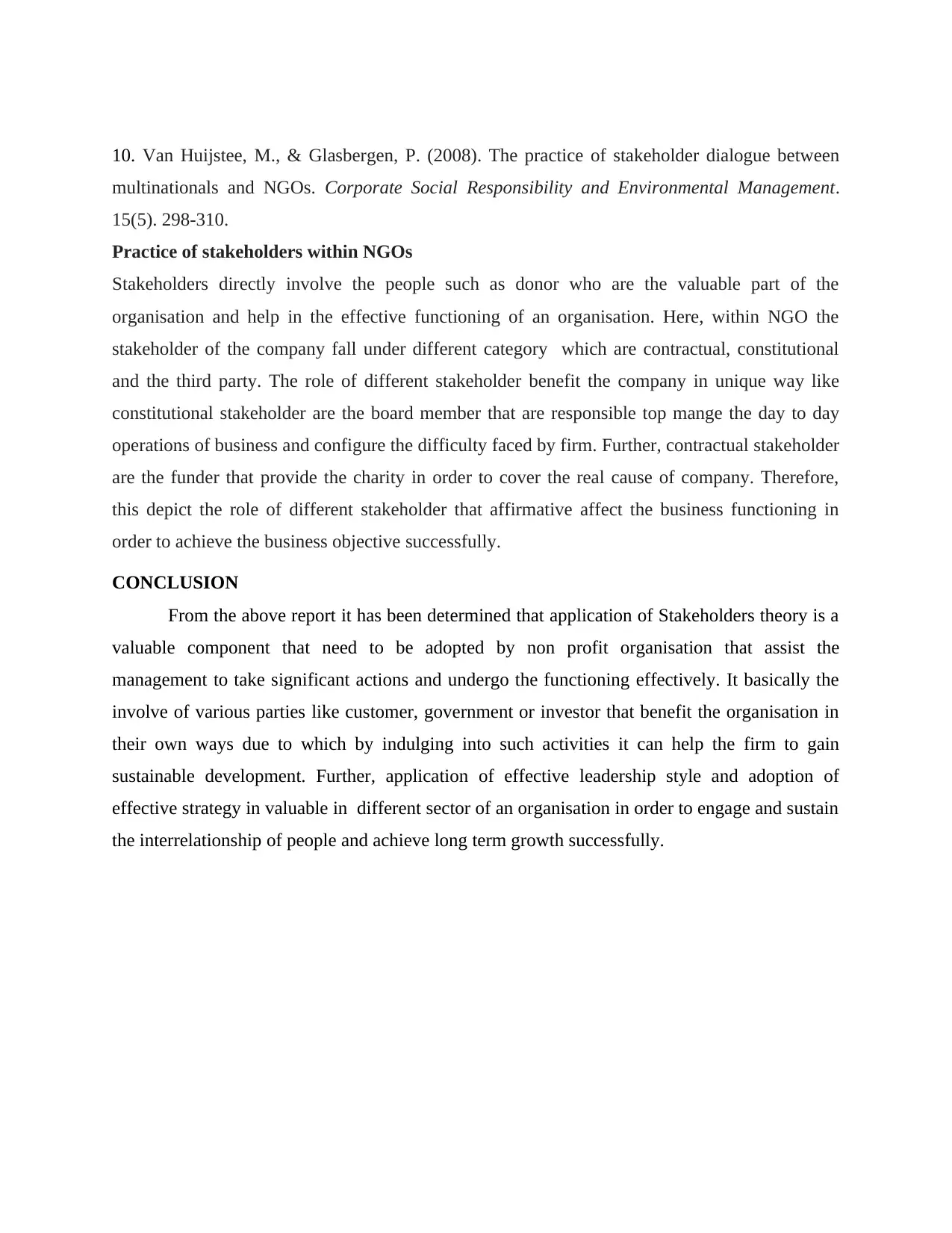
10. Van Huijstee, M., & Glasbergen, P. (2008). The practice of stakeholder dialogue between
multinationals and NGOs. Corporate Social Responsibility and Environmental Management.
15(5). 298-310.
Practice of stakeholders within NGOs
Stakeholders directly involve the people such as donor who are the valuable part of the
organisation and help in the effective functioning of an organisation. Here, within NGO the
stakeholder of the company fall under different category which are contractual, constitutional
and the third party. The role of different stakeholder benefit the company in unique way like
constitutional stakeholder are the board member that are responsible top mange the day to day
operations of business and configure the difficulty faced by firm. Further, contractual stakeholder
are the funder that provide the charity in order to cover the real cause of company. Therefore,
this depict the role of different stakeholder that affirmative affect the business functioning in
order to achieve the business objective successfully.
CONCLUSION
From the above report it has been determined that application of Stakeholders theory is a
valuable component that need to be adopted by non profit organisation that assist the
management to take significant actions and undergo the functioning effectively. It basically the
involve of various parties like customer, government or investor that benefit the organisation in
their own ways due to which by indulging into such activities it can help the firm to gain
sustainable development. Further, application of effective leadership style and adoption of
effective strategy in valuable in different sector of an organisation in order to engage and sustain
the interrelationship of people and achieve long term growth successfully.
multinationals and NGOs. Corporate Social Responsibility and Environmental Management.
15(5). 298-310.
Practice of stakeholders within NGOs
Stakeholders directly involve the people such as donor who are the valuable part of the
organisation and help in the effective functioning of an organisation. Here, within NGO the
stakeholder of the company fall under different category which are contractual, constitutional
and the third party. The role of different stakeholder benefit the company in unique way like
constitutional stakeholder are the board member that are responsible top mange the day to day
operations of business and configure the difficulty faced by firm. Further, contractual stakeholder
are the funder that provide the charity in order to cover the real cause of company. Therefore,
this depict the role of different stakeholder that affirmative affect the business functioning in
order to achieve the business objective successfully.
CONCLUSION
From the above report it has been determined that application of Stakeholders theory is a
valuable component that need to be adopted by non profit organisation that assist the
management to take significant actions and undergo the functioning effectively. It basically the
involve of various parties like customer, government or investor that benefit the organisation in
their own ways due to which by indulging into such activities it can help the firm to gain
sustainable development. Further, application of effective leadership style and adoption of
effective strategy in valuable in different sector of an organisation in order to engage and sustain
the interrelationship of people and achieve long term growth successfully.
1 out of 7
Related Documents
Your All-in-One AI-Powered Toolkit for Academic Success.
+13062052269
info@desklib.com
Available 24*7 on WhatsApp / Email
![[object Object]](/_next/static/media/star-bottom.7253800d.svg)
Unlock your academic potential
Copyright © 2020–2026 A2Z Services. All Rights Reserved. Developed and managed by ZUCOL.





